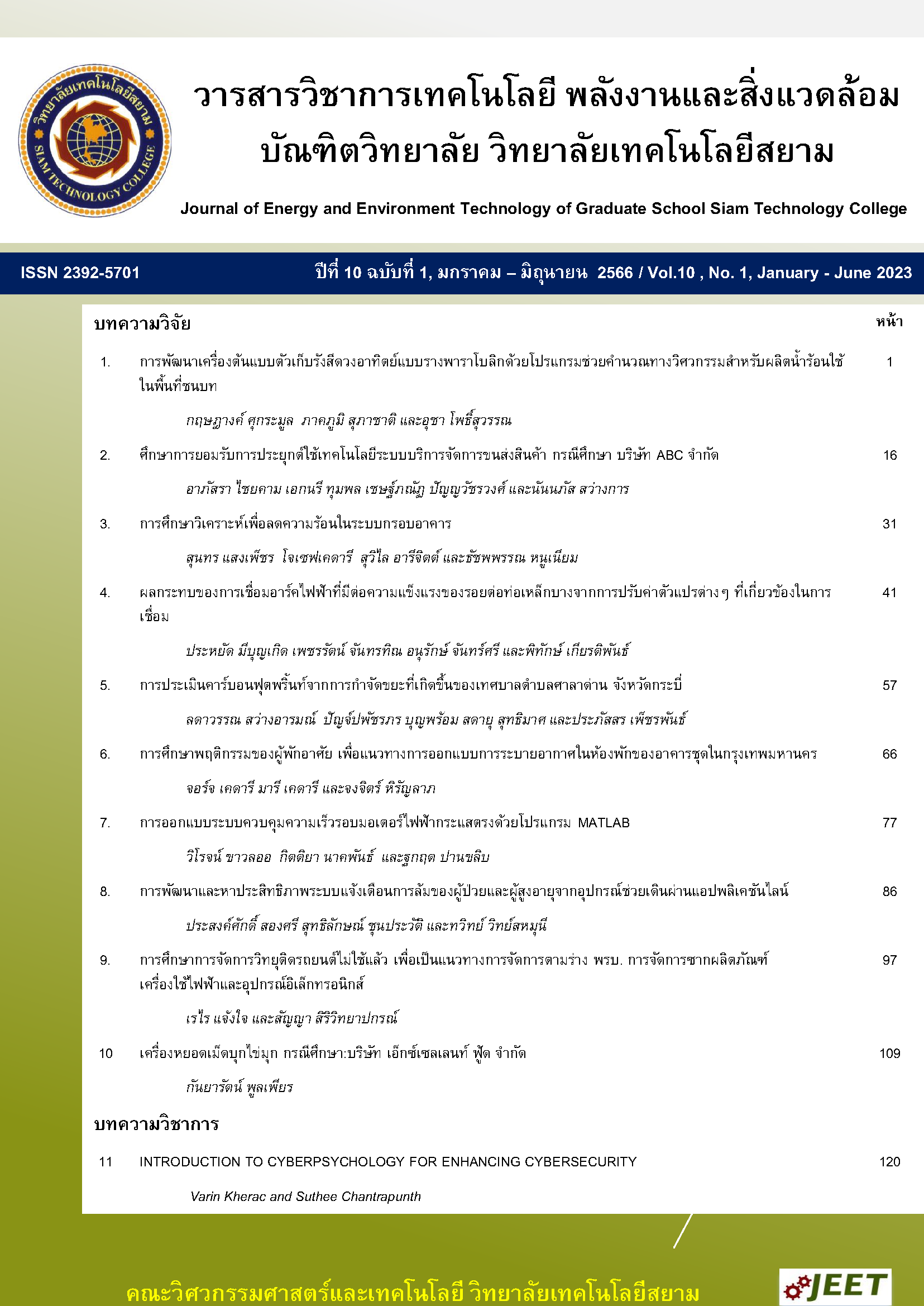Introduction to Cyberpsychology for Enhancing Cybersecurity
Main Article Content
Abstract
This article introduces an overview and introduction to the field of cyberpsychology and how it impacts cybersecurity. It concerns with understanding cyberpsychology and how to managing the online behaviors to reduce risk of cyberattacks from cyber perpetrators. The article shows various methods and techniques used to study the cyberpsychology, such as: surveys, experiments, and observations. It also suggests implications of cyberpsychology for society including the potential for digital literacy education, and the development of new interventions to address online problems. And at the end, it shows the future directions of the research studies of cyberpsychology.
Keywords: Cyberpsychology, Internet Psychology, Cybersecurity, Online Behavior
Article Details

This work is licensed under a Creative Commons Attribution-NonCommercial-NoDerivatives 4.0 International License.
เนื้อหาและข่อมูลในบทความที่ลงตีพิมพ์ในวารสารวิชาการ เทคโนโลยี พลังงาน และสิ่งแวดล้อม บัณฑิตวิทยาลัย วิทยาลัยเทคโนโลยีสยาม ถือเป็นข้อคิดเห็นและความรับผิดชอบของผู้เขียนบทความโดยตรง ซึ่งกองบรรณาธิการวารสารไม่จำเป็นต้องเห็นด้วย หรือว่าร่วมรับผิดชอบใด ๆ
บทความ ข้อมูล เนื้อหา รูปภาพ ฯลฯ ที่ได้รับการตีพิมพ์ในวารสารวิชาการ เทคโนโลยี พลังงาน และสิ่งแวดล้อม บัณฑิตวิทยาลัย วิทยาลัยเทคโนโลยีสยาม ถือเป็นลิขสิทธิ์ของวารสารวิชาการ เทคโนโลยี พลังงาน และสิ่งแวดล้อม บัณฑิตวิทยาลัย วิทยาลัยเทคโนโลยีสยาม หากบุคคล หรือหน่วยงานใดต้องการนำทั้งหมด หรือส่วนหนึ่งส่วนใดไปเผยแพร่ต่อ หรือเพื่อกระทำการใด ๆ จะต้องได้รับอนุญาต เป็นลายลักษณ์อักษรจากวารสารวิชาการ เทคโนโลยี พลังงาน และสิ่งแวดล้อม บัณฑิตวิทยาลัย วิทยาลัยเทคโนโลยีสยาม เท่านั้น
References
Statista. (2023). Number of internet and social media users worldwide as of April 2023. Available at:
https://www.statista.com/statistics/617136/digital-population-worldwide/ (Accessed: 30 January 2023).
Brossard, D., & Scheufele, D. A. (2013). Social science. Science, new media, and the public. Science,
(6115), 40–41. https://doi.org/10.1126/science.1232329.
Smith, A., & Anderson, M. (2018). Social media use 2018: Demographics and statistics. Pew Research
Center: Internet, Science & Tech. Available at: https:// www.pewresearch.org/internet/2018/03/01/social-
media-use-in-2018/
Medical News Today. (2023). Negative effects of technology: What to know. Available at:
https://www.medicalnewstoday.com/articles/negative-effects-of-technology (Accessed: 23 February
.
Ayeni, Oyindamola & Madugba, Judith & Sanni, Joseph. (2022). Cyberpsychology, Behavior and Social
Networking. 10.13140/RG.2.2.22664.29447.
Atrill-Smith, A., Fullwood, C., Keep, M., & Kuss, D. J. (Eds.). (2019). The Oxford handbook of
cyberpsychology. Oxford Univeristy Press. Available at: https://www.oxfordhandbooks.com/view/10.1093/
oxfordhb/9780198812746.001.0001/oxfordhb-9780198812746 (Accessed: 1 February 2023).
American Psychological Association (APA). (2014). Internet Gaming Disorder. Available at:
https://www.dsm5.org/documents/internet%20gaming%20disorder%20fact%20sheet.pdf (Accessed: 1
February 2023).
Ryan, T., & Xenos, S. (2011). Who Uses Facebook? An Investigation into the Relationship between the
Big Five, Shyness, Narcissism, Loneliness, and Facebook Usage. Cyberpsychology, Behavior, and
Social Networking, 14(6), 358-361.
Smith, P. K., Mahdavi, J., Carvalho, M., Fisher, S., Russell, S., & Tippett, N. (2008). Cyberbullying: Its
Nature and Impact in Secondary School Pupils. Journal of Child Psychology and Psychiatry, 49(4),
-385.
Acquisti, A., & Gross, R. (2006). Imagined Communities: Awareness, Information Sharing, and Privacy
on the Facebook. In P. Golle & G. Danezis (Eds.), 6th Workshop on Privacy Enhancing Technologies
(pp. 36-58). Cambridge, UK: PETS.
Debb SM. (2021). Keeping the Human in the Loop: Awareness and Recognition of Cybersecurity
Within Cyberpsychology. Cyberpsychol Behav Soc Netw. 2021 Sep;24(9):581-583.doi:10.1089/cyber.
29225.sde. PMID: 34534015.
Chief Executive. (2023). Available at: https://chiefexecutive.net/almost-90-cyber-attacks-caused-human-
error-behavior/ (Accessed: 30 January 2023).
Duggan, M., & Smith, A. (2013). Online Dating & Relationships. Pew Research Center: Internet,
Science & Tech. Available at: http://www.pewinternet.org/2013/10/21/online-dating-relationships/
(Accessed: 5 February 2023).
Suler, J. (2004). The Online Disinhibition Effect. Cyberpsychology & Behavior, 7(3), 321-326.
Krotoszynski, J. J. (2015). Artificial Intelligence and Human Behavior. Stanford Law Review, 68(1),
-179.
Salaway, G., Caruso, J. B., & Nelson, M. R. (2015). The MOOC Phenomenon: Who Takes Massive
Open Online Courses and Why? International Review of Research in Open and Distance Learning,
(3), 110-127.


